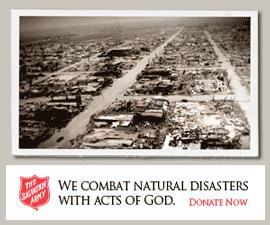
“We Combat Natural Disasters With Acts of God” 10 Years Later: Hurricane Katrina and the Levee Failure
By AdministratorA few years ago the Salvation Army ran a full-page advertisement in popular magazines announcing,

“We Combat Natural Disasters With Acts of God”
A play on the centuries-old claim of disasters as “Acts of God,” this line surely makes many a relief worker and recovery volunteer cringe. Disasters are the result of nature interacting with society in an unfavorable way. Unlike the Salvation Army’s claim, the ability of a community to recover is decidedly not the result of divine intervention, but rather the blood, sweat, and tears of survivors and helpers. (Of course there are economic and political factors that interfere, but let's not forget, those too are human-caused.)
Disaster recovery has a way of bringing out the best in humanity– we should own that. After every disaster, there are volunteers, donations, and expertise which flood into the impacted community. While there are struggles, disagreements, and it certainly isn’t easy, neighbors help neighbors, communities help communities, and countries help countries. Disaster survivors often note that they were able to rebuild because their community came together and helped one another. Interestingly, each community tends to think they are unique in this. In reality though, it’s not just New Orleanians that come together after disaster, or Americans that come together after disaster but it seems to be global. In Haiti, in Japan, in Pakistan, in South Sudan, in Nepal — wherever disaster strikes, human compassion is universally present… at least for awhile.
 We forget. The media shifts their focus. We don’t see the pictures anymore. The frustrations of survivors, the lack of government assistance, the complexities of the insurance claims becomes a tired narrative. When a new shiny disaster happens, the “disaster porn” plays out on CNN, we text to donate, and then the cycle starts again. Our compassion and humanism in action seems limited, or at least divided among tragedies.
We forget. The media shifts their focus. We don’t see the pictures anymore. The frustrations of survivors, the lack of government assistance, the complexities of the insurance claims becomes a tired narrative. When a new shiny disaster happens, the “disaster porn” plays out on CNN, we text to donate, and then the cycle starts again. Our compassion and humanism in action seems limited, or at least divided among tragedies.
In a society that struggles to keep our attention focused for more than 140 characters, it is a challenge to keep us focused when a recovery is expected to take 10 years or more. How do you keep people, mainly donors, interested in a long and tiresome process? In 2005, New Orleans became a domestic case study for this question. Pre-Katrina, such a long recovery from a disaster on US soil was unprecedented in livable memory.
As we arrive this August at the 10-year anniversary of Hurricane Katrina and subsequent levee failures I am afraid to say there are no clear answers. I would speculate two ways New Orleanians have kept the fight alive. The first is the reality of a catastrophe so huge, so shrouded in human error and loss of life that it inevitably became integrated into American culture. Katrina is still a frequent reference. It has served as the comparison event for every disaster that has happened in the past 10 years and entered our cultural lexicon in the form of political commentary ("Obama's Katrina"), rap songs ("Lil’ Wayne, “After Disaster"), and popular TV ("Treme"). However for the south, it is a time divider (before The Storm and after The Storm). The key to not forgetting? Don’t let anyone forget.
The second is the seemingly endless call and response between local New Orleans nonprofits and volunteers around the world. Nonprofit organizations have been central to the recovery of New Orleans. When government failed and existing nonprofits were overwhelmed, new groups sprang up all over the city to address unmet needs. An eclectic mix of well-seasoned international and national aid groups, existing local nonprofits that expanded their missions, and a plethora of new groups have together raised millions of dollars and hosted hundreds of thousands of volunteers since 2005. But ultimately, 10 years later, it has been the resolve of New Orleanians and local grassroot nonprofits fueled with volunteers from all over the world that have rebuilt New Orleans.
Undoubtedly there were humanists volunteering their time and donating money to help survivors, but in 2005 there was no national Humanist Disaster Recovery program. In fact, Foundation Beyond Belief did not even exist yet. Though it has been other, more recent disasters that have directly inspired the creation of HDR Drive (Horn of Africa Famine 2011) and HDR Teams (Moore Oklahoma Tornado 2013), Katrina is the silent foundation for everything we have created. It is the disaster that started our modern conversation of nonprofits in disaster recovery. The majority of the research that we consulted in developing our evidence-based programs drew primarily on the Gulf Coast’s experience.
Disasters are inevitable. We can not predict and prepare for every scenario, but we can, based on past disasters, more effectively manage them. Our goal at FBB is to continue to use the research and lessons learned to create the most effective programs to help disaster survivors around the world. We, representing the humanist community, promise to advocate, volunteer alongside, and donate to survivors and the secular organizations that support them.
